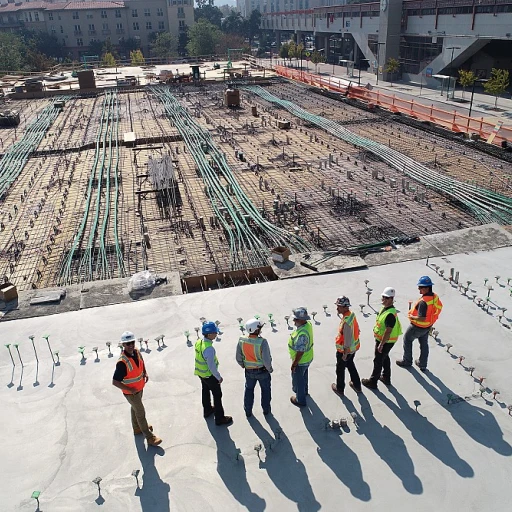Understanding AI in Talent Management
AI: Transforming the Landscape of Talent Management
In the world of business administration, where human resources are paramount, artificial intelligence is no longer a futuristic concept but a current reality. Talent management has evolved dramatically with the integration of AI technologies, offering new avenues for efficiency and precision. The task of skillfully managing talent, which once heavily relied on human intuition, now benefits from data-driven insights. Understanding AI's role begins with recognizing its ability to process vast amounts of data that were previously unimaginable to coordinators. By analyzing patterns, AI can identify optimal skill sets for specific job titles, unearthing hidden talents in current employees and streamlining external recruitment processes. AI's capabilities extend to predictive analytics, enabling businesses to anticipate future skills that may be necessary, thus aligning talent acquisition strategies with long-term goals. As a talent coordinator or manager, leveraging these insights aids in better decision-making, ensuring individuals are not just performers but potential leaders. Moreover, in the bustling environment of the United States' job market, where competition for top talent is fierce, AI stands as a crucial business partner. It aids human resources not just in hiring but also in managing employee relations, performance, and career development. The utilization of AI does not simply automate tasks; it empowers human managers and coordinators to focus on strategic elements that machines cannot replicate, such as fostering public relations and maintaining a dynamic company culture. By integrating AI, organizations can enhance their overall employee experience, paving the way for sustainable growth and success. For more on how AI is revolutionizing talent management, dive into how AI is transforming employee development.The Evolving Role of Talent Coordinators
The Shifting Dynamics of Talent Coordination
The role of a talent coordinator has seen a significant shift in today's fast-paced business environment. With the rapid advancement of artificial intelligence, coordinators find themselves at the intersection of technology and human resources, steering the talent management services with data-driven insights. As organizations in the United States and globally strive to adapt to changing climates, understanding the evolving function of these professionals becomes paramount for effective talent management.
Talent coordinators are no longer confined to the traditional boundaries of job titles and job descriptions. They are increasingly expected to integrate advanced AI tools and leverage data analytics to optimize employee performance and engagement. The transition to a more AI-centered approach not only enhances the coordinator's role but also adds value to the organization's overall talent strategy.
Key responsibilities now include aligning AI capabilities with human resources objectives, such as streamlining recruitment processes, fostering employee development, and promoting career growth. In a city like New York, where business dynamics are constantly evolving, talent coordinators are pivotal in ensuring that the workforce is aptly skilled and continuously growing.
Moreover, the rise of AI in HR demands a new set of skills for coordinators, who must now possess proficiency in business administration, data management, and social services. They serve as a bridge between technology and human interaction, ensuring that AI applications in recruitment and employee relations are both ethical and effective.
As the role continues to evolve, talent coordinators are becoming indispensable partners in talent acquisition. Their expertise in performance management and employee engagement strategies is critical in maintaining a productive and satisfied workforce. For more insights into how AI is reshaping the realm of employee development and the role it plays in enhancing talent management, you can explore the comprehensive resources available at AIHR Institute's insights.
AI-Driven Recruitment Processes
Automation in Recruitment: A Game Changer
As businesses strive to optimize their talent management processes, AI-driven recruitment has emerged as a pivotal advancement. With the rise of intelligent algorithms, HR departments are better equipped to streamline their hiring practices. These AI systems can swiftly evaluate vast pools of applicants, filtering resumes for relevant job titles and skills, thus easing the workload of human resources professionals.
AI-powered platforms can analyze data from various sources, including social services profiles, previous job performance, and employee relations histories, to predict the best candidates for specific roles. This not only accelerates the recruitment process but also enhances the objectivity and fairness of the selection by minimizing biases often associated with human decision-making.
Benefits for Talent Managers and Coordinators
For talent coordinators and managers, these AI tools function as essential partners in managing applications and communications. Advanced AI systems, with their ability to learn and evolve, assist talent managers in maintaining an organized, yet dynamic approach towards recruitment coordination. This change allows human resources professionals to focus more on strategic tasks such as career counseling and talent development initiatives in the United States and beyond.
Transforming the Candidate Experience
The integration of AI in recruitment not only benefits HR staff but also enhances the candidate experience. Automated systems provide real-time updates and feedback to applicants, fostering a sense of engagement. This creates positive interactions throughout the hiring process and prepares candidates for potential roles in business administration, public relations, and executive assistant positions, among others.
Despite these advancements, it is crucial to consider the challenges and ethical implications of AI in recruitment. Transparency and adherence to ethical standards ensure that AI-driven recruitment remains fair and inclusive, preserving the delicate balance between technology and human touch.
Enhancing Employee Engagement with AI
Augmenting Employee Experiences through AI
As businesses in New York and across the United States prioritize employee satisfaction, AI technologies present opportunities to enhance the employee experience and performance management. By analyzing data on employee interactions, engagement levels, and skills development, AI helps managers make informed decisions that lead to a more fulfilling work environment.
For a talent manager or recruitment coordinator, employing AI in employee relations can simplify tedious tasks. Employee feedback can be efficiently sorted and analyzed through AI-powered platforms, offering insights that drive meaningful change and foster a healthy work environment. This eases the workload on human resources teams, allowing them to focus on more strategic initiatives.
Talent coordinators benefit from AI's capabilities to craft personalized development paths for employees. AI-driven tools can identify specific skills development opportunities tailored to individual career goals and job titles, enhancing both job satisfaction and business outcomes. By aligning employee skills with the strategic goals of the organization, AI supports not only the retention of talent but also the advancement of their careers.
AI technologies also enable continuous employee engagement by providing real-time feedback mechanisms. This feedback loop ensures that employees' voices are heard and addressed promptly, improving job satisfaction and performance.
In a dynamic business landscape, employee engagement remains paramount to maintaining a competitive edge. AI systems, acting as valuable resources, facilitate an environment where talent can thrive, ensuring that every staff member's potential is fully realized.








